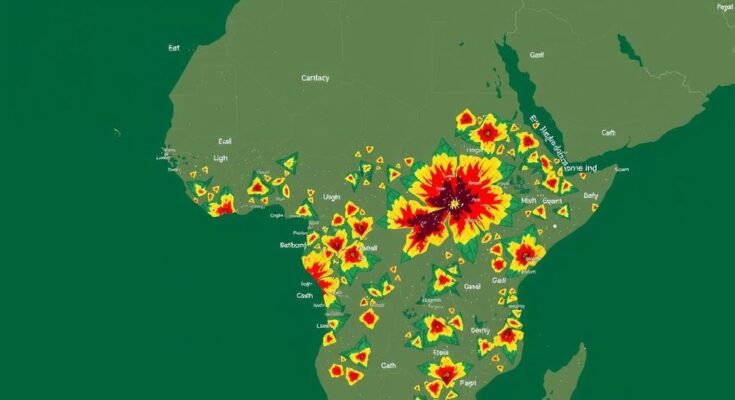This article explores how climate shocks significantly affect the performance of firms and tax revenues in Zambia’s formal sector. Extreme weather events like heavy rainfall and high temperatures reduce sales and tax collection, particularly in crucial sectors such as manufacturing and construction. The firms respond by decreasing employment and wages, signaling a productivity decline. The study emphasizes the necessity for policies that address the combined challenges of climate change and economic resilience in low-income countries.
The UNU WIDER Working Paper 2024/71, authored by Kwabena Adu-Ababio, Evaristo Mwale, and Rodrigo Oliveira, addresses the significant intersection of climate shocks and economic resilience in Zambia’s formal sector. It presents empirical evidence on how extreme weather conditions, such as excessive rainfall and high temperatures, adversely affect firm performance and public tax revenue. Data collected from various sectors indicates that these climate events lead to decreased sales, reduced input purchases, and lowered tax collections, with the manufacturing, retail, accommodation, and construction sectors being particularly hard-hit. Consequently, firms often respond by scaling back their workforce and wages, signaling a decline in overall productivity.
The study is particularly crucial given that low-income countries typically grapple with both climate-related challenges and limited capabilities in domestic revenue mobilization. By focusing on Zambia, this paper fills a gap in the existing literature, highlighting the necessity for integrated policies that address both climate risks and economic stability simultaneously. It underscores the potential long-term impacts on economic performance and suggests that tax revenues, especially from sectors heavily reliant on climate stability, may become increasingly vulnerable to environmental changes.
Climate change poses an increasingly severe threat to the economic stability of low-income nations. These nations often operate with limited financial resources and face pressure from ongoing environmental challenges. Understanding the profound implications of economic shocks induced by climate change is vital for formulating effective responses and resilient economic strategies. This paper provides compelling evidence that informs policymakers of the need to enhance resilience through adaptable economic structures and robust fiscal policies that can withstand climatic variations.
Currently, this paper does not contain specific quotes that can be extracted. Therefore, reference quotes are excluded from this summary.
No external links or references have been explicitly provided in the working paper summary.
In conclusion, the findings of this paper are pivotal for understanding the complexities surrounding climate shocks and their ripple effects on economic systems in low-income contexts such as Zambia. The study advocates for an approach that unifies economic and environmental policy, emphasizing the paramount importance of safeguarding both firm productivity and government revenue against the backdrop of climate change. In light of these findings, it is imperative for nations to adapt their economic frameworks to mitigate the impacts of climate shocks while ensuring sustainable growth.
The intersection of climate change and economic stability is an increasingly pertinent issue for low-income countries. Such nations often exhibit a dual vulnerability to extreme weather events while simultaneously struggling with the mobilization of domestic revenues. Zambia serves as a significant case study, wherein firm-level data illustrates the tangible impacts of climate shocks on formal sector performance. This allows for a comprehensive analysis of how adverse environmental conditions can lead to widespread economic implications, particularly in sectors critical to both employment and economic output. The exploration of this topic not only contributes to the literature on climate economics but also offers vital insights for policymakers aiming to foster resilience in the face of ongoing climatic challenges.
This analysis reinforces the pressing need for an integrated approach to address the dual challenges posed by climate shocks and economic resilience in low-income countries. The findings suggest that policymakers must prioritize creating adaptive economic frameworks and resilient public finance systems that can withstand the inevitable impacts of climate variability. Ultimately, addressing both firm productivity and government revenue in a cohesive manner is essential to promoting sustainable development and economic stability in vulnerable regions such as Zambia.
Original Source: reliefweb.int




